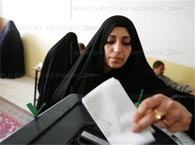Iraq's provincial elections start amid fear of fraud
 Baghdad - Iraqis were going to the polls on Saturday in the biggest elections in the country's history as receding violence created conditions far more secure than the last elections in 2005.
Baghdad - Iraqis were going to the polls on Saturday in the biggest elections in the country's history as receding violence created conditions far more secure than the last elections in 2005.
Some 14,400 candidates were contesting 440 provincial seats, creating fierce competition among candidates that is expected to lead to greater representation of the country's sects.
Sunnis who boycotted the last elections, delivering disproportionate representation for Kurds and Shiites, are now competing for more seats.
The elections present a major test to Iraqi forces as the administration of US President Barak Obama prepares a troops pull-out plan. Only two days before the elections, three Sunni candidates were murdered in different places in Iraq.
In the restive Diyala province security forces imposed a curfew a day before the elections as the Independent Higher Electoral Commission (IHEC) announced a halt to electoral campaigning and removal of all electoral banners and posters.
Iraqis will choose representatives in 14 out of Iraq's 18 provinces. The three northern Kurdistan provinces and the long disputed Kirkuk will not go to vote.
The latter in particular has a multi-ethnic population of Kurds, Arabs and Turkman who have been clashing over control of the oil-rich province. Iraq's central government decided to postpone the four provinces' elections to a later date.
Apart from violence, election fraud was another threat. Far away polls in villages and rural areas might have few or no observers compared to bigger cities.
Also, many candidates have been buying peoples votes with hefty amounts, and there has been criticism of the IHEC for not doing enough to control it.
While the turnout is expected to be high, many Iraqis are not optimistic that the elections will change much.
"I don't expect a radical change in Iraq's current situation powerful bocks will be a head in the coming four yeas, and this matter worries us so much," said 55-year-old civil servant Mohamed Shaker, summing up the view of many. (dpa)